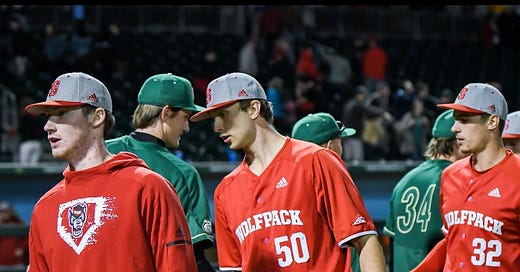15 to 18 Years Old
Building the Measurables
This is the age where data starts to matter. College recruiters, trainers, and scouts are paying attention to how hard you throw, how fast you run, how explosive you are in the weight room. Strength, speed, and power output become differentiators. If you want to stand out, you need to put time into building these tools. That doesn’t mean you chase numbers blindly just to look good at showcases. Throwing hard is great, but if it’s inconsistent or breaks your body down, it doesn’t help you. Lifting big numbers is cool, but not if your movement quality falls apart. The numbers need context—they need to be paired with skill, sustainability, and repeatability. And to get there, you need structure. Random workouts and going through the motions won’t cut it anymore. Your training has to reflect your goals, and you have to start being intentional with every throw, every lift, every sprint.
Knowing What You Need
One of the most important things a player can develop during this stage is self-awareness. What’s holding you back? What’s your limiting factor? If your swing leaks power, fix it. If your mechanics don’t allow you to throw hard and stay healthy, address that. Stop looking around at everyone else’s path and start doubling down on yours. You’ll see players committing early, getting offers left and right, and if you’re not in that mix yet, it can make you feel like you’re behind. But that doesn’t mean you’re doing anything wrong—it just means you’re on a different timeline. Take an honest inventory of your game, and instead of stressing about what you don’t have, start working with purpose on the pieces you need. This is also the time to begin building a team around you—a network of people who are capable, supportive, and invested in your success. Whether that’s a trainer, pitching coach, lifting coach, or someone helping with recruiting, surround yourself with people who know what they’re doing and will tell you the truth.
Learning Your Game
By now, you should be developing a real understanding of your strengths and weaknesses, and more importantly, how to leverage them in games. Maybe you’re a pitcher who thrives in high-pressure situations, or maybe you’re a quiet workhorse who dominates with command and tempo. Maybe your value comes from elite speed or clutch hitting. You need to figure out what your superpower is and lean into it. This is also the time to build routine and structure into your preparation. Good players don’t guess—they prepare. That means developing warm-up routines, recovery protocols, and consistent ways to improve. These years aren’t just about talent—they’re about refining what works for you. And it’s okay if that looks different from the guy next to you. As long as it helps you perform better, more consistently, it’s worth doing.
John


